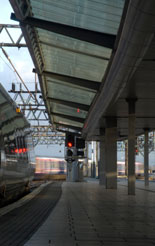Greater Manchester has been given the go-ahead to combine unprecedented investment in public transport with a local congestion charging scheme.
The government approved package includes plans for up to 22 miles of extension to the Metrolink tram; transformed bus services across Manchester, including new, direct buses running from the north to the south of the city; and 120 extra yellow school buses.
There will also be major improvements to rail; the upgrade of 41 train stations; and the doubling of park and ride provision on the rail and Metrolink networks.
The majority of these improvements are planned to be delivered before the introduction of the local congestion charge in 2013. The charging scheme will operate only at peak times, when congestion is at its worst.
“Manchester’s economic renaissance is a major British success story. It is one of the fastest growing economies in the UK, but congestion has become an increasing brake on its future prosperity, with the potential to cost the city as many as one in seven of future jobs,” commented Ruth Kelly, Transport Secretary.
“Greater Manchester’s proposals will sustain the region’s growth, bring benefits to all those who live in the area and enable Greater Manchester to compete with the best cities across the world.”
The government is proposing to invest £1.5bn in support of the package of measures. The remaining investment will be funded by Greater Manchester.
There will be a full public consultation on the proposals.
Manchester’s transport and congestion charge proposals
- The £2.8bn package consists of £1.5bn from the Department for Transport, £1.2bn from local contributions, £0.1bn local third party contribution
- The proposed congestion charge is designed around a ‘twin cordon’ system which will operate at peak times only. Vehicles will be charged according to their crossing of cordons. The scheme will use tag and beacon technology supported by Automatic Number Plate Recognition (ANPR)
- Up to 22 miles of new lines to the Metrolink
- Significant expansion of capacity on local trains
- Improvements to 41 rail stations
- A robust and reliable bus network
- 120 new yellow school buses
- Eight new state-of-the-art interchanges
- Doubling of park and ride provision on rail/Metrolink networks
- Information displays at all major bus and train stations giving passengers up to date information on when their bus or train will arrive
- Improved roadside information for drivers, warning them of accidents and delays
- Integrated ticketing arrangements, including smartcards
- Greater support to help people make better travel choices, including more cycle lanes and secure parking for bikes
Further information
- See Special Report Manchester congestion charge spells confusion for UK business








